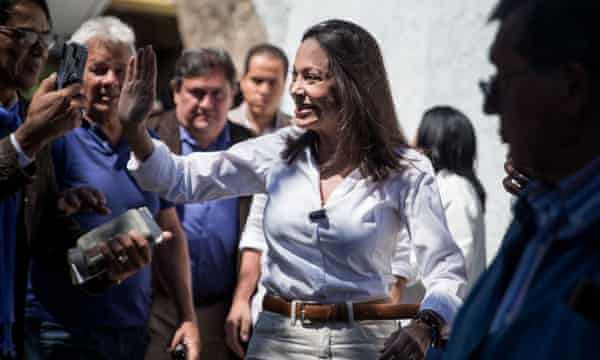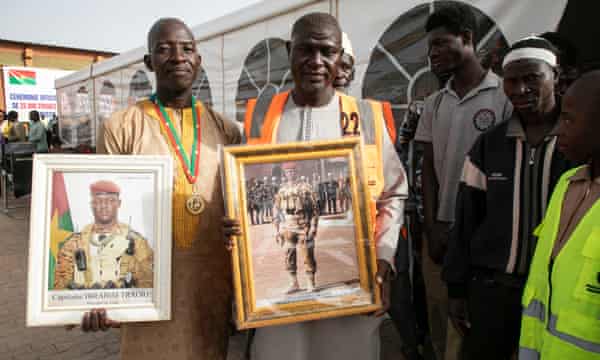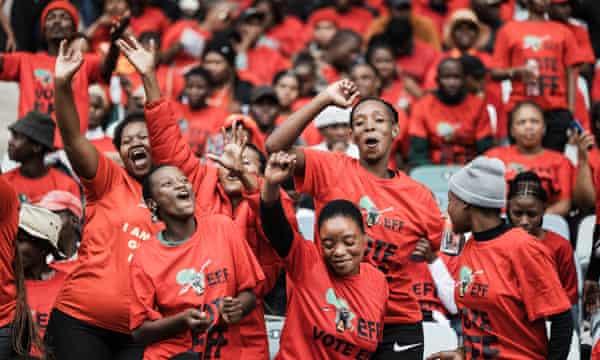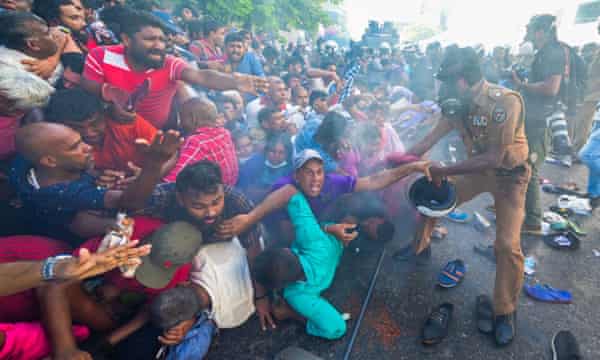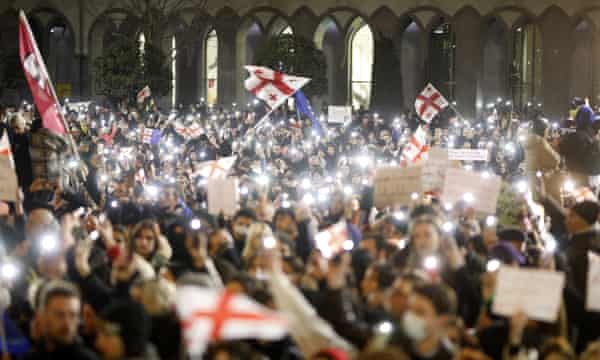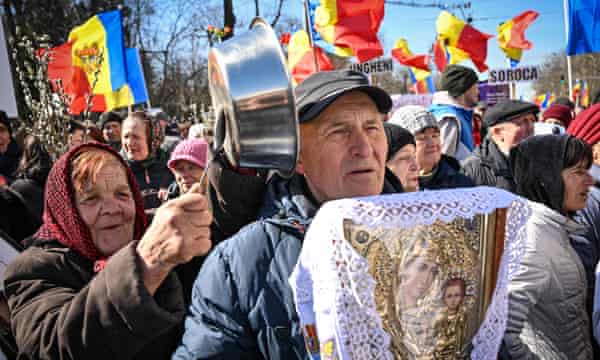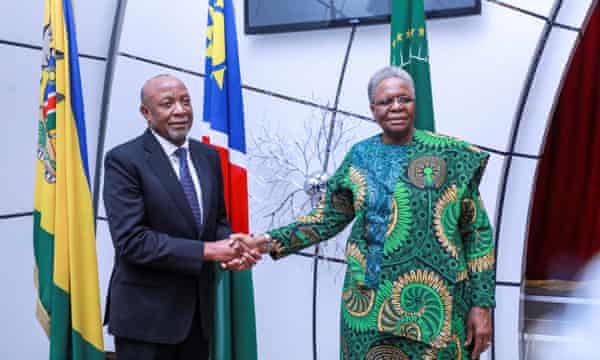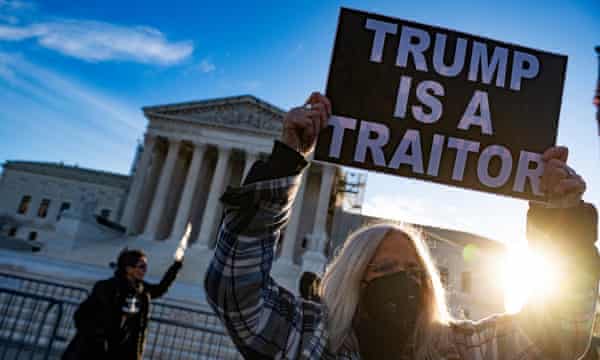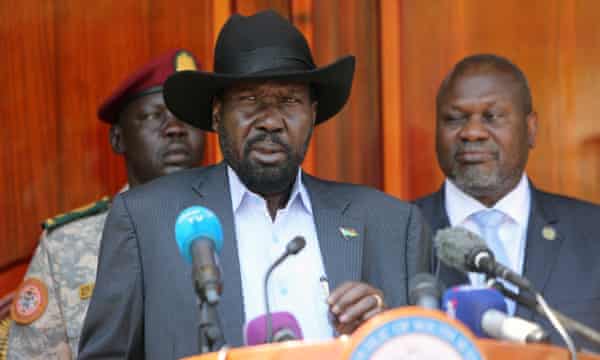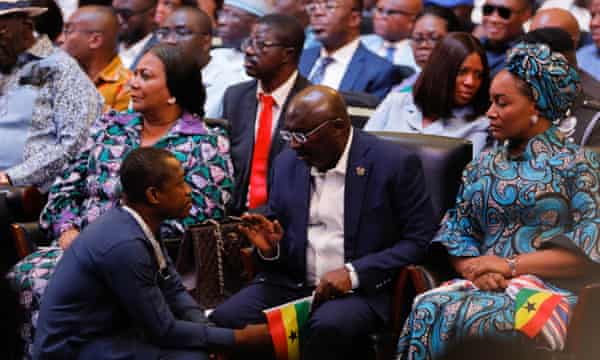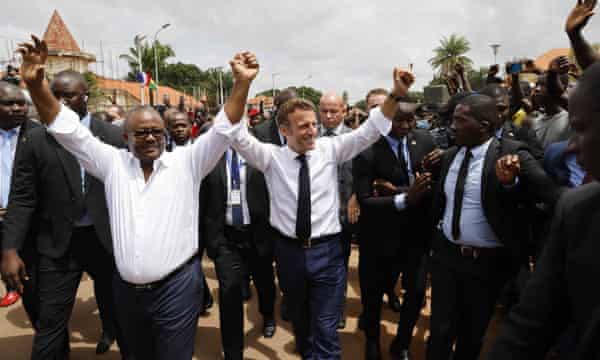- Joined
- Apr 29, 2015
- Messages
- 18,290
- Likes
- 56,247
From Guardian
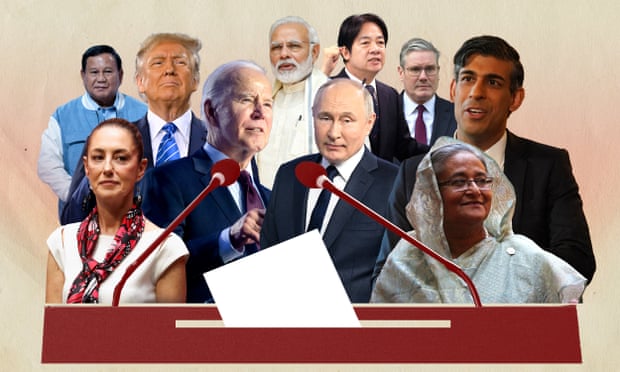
2024: Year of elections
Elections tracker 2024: every vote and why it matters
More than 80 countries, more than half the world’s population, will vote this year in elections that could be pivotal for democracy
BHUTAN
30 November 2023 – 9 January 2024: The tiny Himalayan kingdom elected the liberal former prime minister Tshering Tobgay and his People’s Democratic Party (PDP) with a large majority. Tobgay has vowed to promote the investment needed to boost the country’s $3bn economy and address the unemployment that is driving an increasing number of young Bhutanese abroad, mainly to Australia, in search of better opportunities.
BANGLADESH
7 January: Prime minister Sheikh Hasina won a fifth term in office in an election that was overshadowed by a ruthless crackdown on the opposition and voter turnout of just 40%. In the months leading up to the election, tens of thousands of opposition leaders and rank and file party members were arrested en masse with at least nine dying in jail in the three months preceding the election.
TAIWAN
13 January: Taiwan elected Lai Ching-te as its next president, ushering in a historic third term in power for the pro-sovereignty Democratic Progressive party (DPP) and angering Beijing. Two days after the elections, China managed to reduce the number of Taiwan’s formal diplomatic allies to just 12, and has also begun increasing its military threats, with warplanes frequently entering Taiwanese airspace.
COMOROS
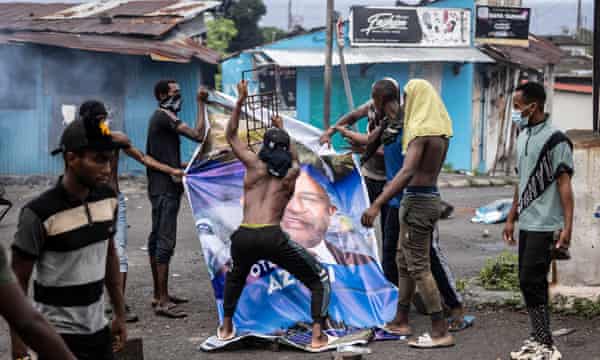 Opposition supporters destroy a billboard image of Comoros President Azali Assoumani and his Convention for the Renewal of Comoros party. Photograph: Olympia de Maismont/AFP/Getty Images
Opposition supporters destroy a billboard image of Comoros President Azali Assoumani and his Convention for the Renewal of Comoros party. Photograph: Olympia de Maismont/AFP/Getty Images
14 January: President Azali Assoumani won a fourth five-year term more than two decades after he first came to power in a coup. Though the country experienced three democratic transitions of power after he first stepped down in 2006, his return in elections in 2016 have since seen him erode democratic mechanisms. After January’s vote opposition candidates alleged fraud and ballot-stuffing.
TUVALU
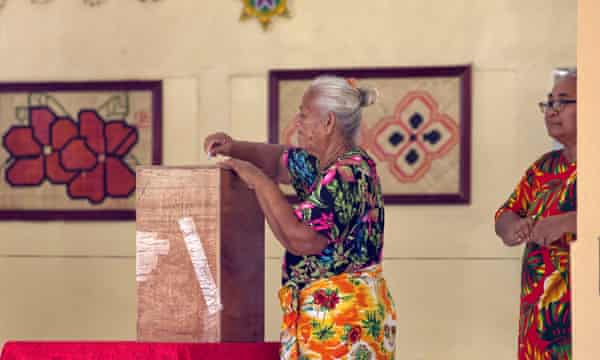 A woman places her vote into a ballot box on election day in Funafuti, the capital of the south Pacific nation of Tuvalu. Photograph: Sam Pedro/AFP/Getty Images
A woman places her vote into a ballot box on election day in Funafuti, the capital of the south Pacific nation of Tuvalu. Photograph: Sam Pedro/AFP/Getty Images
26 January: Tuvalu’s prime minister, Kausea Natano, lost his seat in the general election but a new leader is yet to be selected. Incoming lawmakers will decide on the Pacific nation’s next leader but dangerous weather has prevented them from reaching the capital Funafuti to hold talks. The outcome is being closely watched by Taiwan, China, the US and Australia amid a geopolitical tussle for influence in the Pacific. Tuvalu is one of three remaining Pacific allies of Taiwan, and one contender for prime minister has said the new government should review whether Taipei or Beijing can best respond to Tuvalu’s development needs.
FINLAND
28 January-11 February: Centre-right former prime minister Alexander Stubb won an election runoff against rival Pekka Haavisto in what was seen as the country’s most high-stakes presidential election in a generation. It was the country’s first poll since it joined Nato and took place amid escalating geopolitical drama on the border with Russia.
February
EL SALVADOR
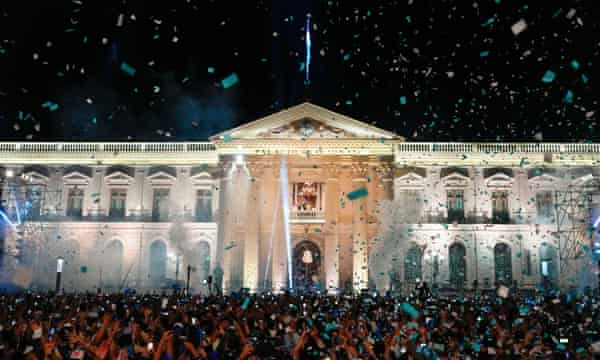 El Salvador President Nayib Bukele, accompanied by his wife Gabriela Rodriguez, addresses supporters from the balcony of the presidential palace in San Salvador, El Salvador, after polls closed on 4 February. Photograph: Moisés Castillo/AP
El Salvador President Nayib Bukele, accompanied by his wife Gabriela Rodriguez, addresses supporters from the balcony of the presidential palace in San Salvador, El Salvador, after polls closed on 4 February. Photograph: Moisés Castillo/AP
4 February: President Nayib Bukele won a thumping victory after voters rewarded him for a fierce gang crackdown that has transformed security in what was once one of the world’s most dangerous countries. But his second term was unconstitutional and his New Ideas party’s sweep of parliamentary seats means Bukele will wield unprecedented power. Analysts also suggest that the suspension of civil liberties and imprisonment of more than 2% of the country’s adult population – many without charge – is unsustainable.
MALI
Were scheduled for 4 February: The junta said in September it would postpone presidential elections set for February – which was already a two-year delay on what as agreed by interim authorities after the 2020 coup led by Colonel Assimi Goïta. It appears the military plans to hang on to power indefinitely in the west African country, which has suffered an upsurge in terrorist violence since the military takeover.
AZERBAIJAN
7 February: President Ilham Aliyev won his fifth term with over 90% of votes in elections observers said were neither free nor fair. He had called the poll early after recapturing the breakaway region of Nagorno-Karabakh from Armenia last year and launching a crackdown on independent journalists.
HAITI
Were due by 7 February 2024: Elections were supposed to happen in 2023 with an earlier agreement in place for power to have been transferred by 7 February 2024. Since the assassination of president Jovenel Moïse in 2021, Haiti has descended into crisis, with violence from street gangs and vigilantes prevalent. In 2023, the last 10 remaining senators in parliament officially left office, leaving the country without a single democratically elected government official. In February this year, prime minister Ariel Henry, who himself is seen as illegitimate by most Haitians, pledged to hold general elections as soon as the security issues were resolved.
PAKISTAN
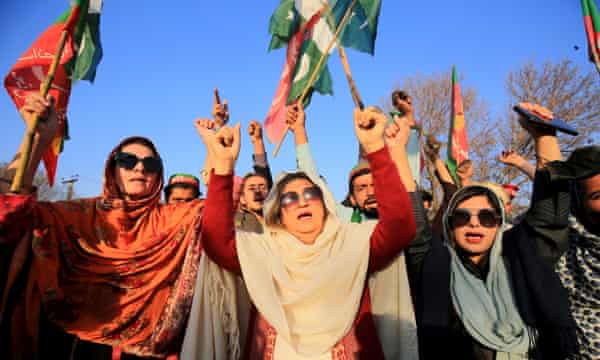 Supporters of Imran Khan’s PTI party protest against alleged rigging in general elections in Peshawar. Photograph: Arshad Arbab/EPA
Supporters of Imran Khan’s PTI party protest against alleged rigging in general elections in Peshawar. Photograph: Arshad Arbab/EPA
8 February: Despite opposition from the powerful military and a state-led crackdown, the PTI party of jailed former prime minister Imran Khan won the most votes in legislative elections. However after days of wrangling and political horse-trading a coalition including the rival Pakistan Muslim League-Nawaz (PLM-N) and the Pakistan People’s party (PPP) agreed to form the next government with Shehbaz Sharif as prime minister and ensure that that the PTI party cannot take power.
INDONESIA
14 February: Prabowo Subianto, a 72-year-old former general who was dismissed from the military amid allegations he was involved in kidnapping and torture in the 1990s, is on course to win the presidency in the world’s third largest democracy with more than half of votes counted. Prabowo has always denied wrongdoing but the results have provoked fear among rights activists that accountability for past atrocities will fade even further under his leadership, and that his future government will have little regard for human rights.
BELARUS
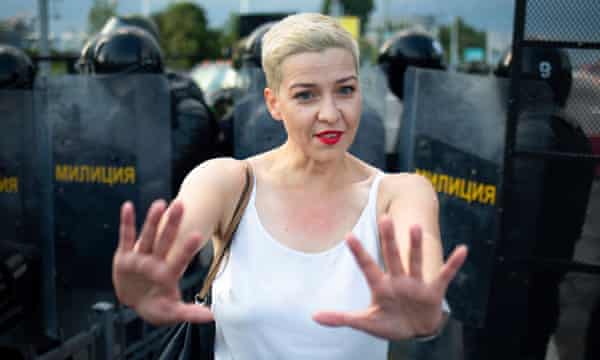 Maria Kolesnikova, one of Belarus’ opposition leaders, at a rally in Minsk, Belarus in August 2020. She has since been jailed for 11 years and no one has heard from her since February 2023. Photograph: AP
Maria Kolesnikova, one of Belarus’ opposition leaders, at a rally in Minsk, Belarus in August 2020. She has since been jailed for 11 years and no one has heard from her since February 2023. Photograph: AP
25 February: No surprises are expected in this year’s parliamentary elections, the first since presidential elections won by longtime dictator Alexander Lukashenko sparked widespread protests in 2020. He has since cracked down even harder on opposition figures, including his main challenger Svetlana Tikhanovskaya who is now in exile. But the elections will see the All-Belarusian People’s Assembly become an official organ with immense powers, after a constitutional change made last year. According to one analyst, “It’s a step on the path to a Belarus without its contested leader Alexander Lukashenko, even if it’s impossible to say how long that path will be.”
CAMBODIA
25 February: Human rights activists have warned that the country is “continuing on its descent into authoritarianism” ahead of Senate elections. Last year Hun Sen, who had ruled the country for almost four decades, handed power to his son, military general Hun Manet, just a month after parliamentary elections widely criticised as a sham. Opposition leaders continue to be jailed and activists have reported brutal physical attacks.
SENEGAL
Were scheduled for 25 February: President Macky Sall’s decision to delay presidential elections scheduled for 25 February just weeks beforehand triggered outrage from the opposition and pitched the west African nation, one of the region’s more stable democracies, into uncharted constitutional waters. However Sall later pledged to abide by a court ruling that overturned the election postponement bill and said he would hold consultations to organise the vote as soon as possible. Some opposition figures have called on Sall to set an election date before 2 April, when his mandate expires.
March
IRAN
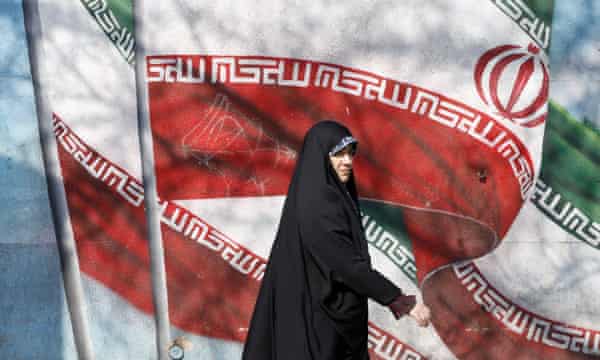 An Iranian woman walks next to a wall painting of Iran’s national flag on a street in Tehran. Photograph: Abedin Taherkenareh/EPA
An Iranian woman walks next to a wall painting of Iran’s national flag on a street in Tehran. Photograph: Abedin Taherkenareh/EPA
1 March: Elections for parliament (Majlis) and the Assembly of Experts, the body which chooses the Supreme Leader, will be the first since the massive protests sparked by the death of Kurdish woman Mahsa Amini in police custody in 2022. Observers have therefore said that turnout could have a “symbolic value”. However, Supreme Leader Ali Khamenei has already disqualified reformist former president Hassan Rouhani from running for the assembly and in the last Majlis election disqualified half of the candidates.
PORTUGAL
10 March: The second snap election in as many years was called in November after the Socialist prime minister António Costa resigned amid a corruption investigation. Polls indicate the party will win the most votes, but not enough for it to form a government. A centre-right coalition is predicted to hold the majority, and as in other European countries the far-right is expected to make gains. In February, the far-right Chega party jumped 6 percentage points in an opinion poll to break the 20% support mark for the first time.
RUSSIA
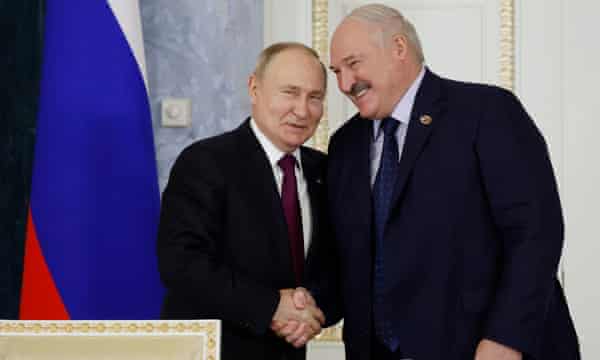 Russian President Vladimir Putin (L) and Belarusian President Alexander Lukashenko. Photograph: Dmitry Astakhov/SPUTNIK/GOVERNMENT PRESS SERVICE POOL/EPA
Russian President Vladimir Putin (L) and Belarusian President Alexander Lukashenko. Photograph: Dmitry Astakhov/SPUTNIK/GOVERNMENT PRESS SERVICE POOL/EPA
15-17 March: In an election which appears to be a formality, President Vladimir Putin will seek a fifth term. Political opposition already clamped down on by his government has been further stifled after his invasion of Ukraine two years ago with prominent opposition politicians such as Alexei Navalny and Ilya Yashin jailed. Just a month before the election Navalny died in unclear circumstances in prison, leaving what little opposition remains without a charismatic figurehead. Western leaders have blamed Putin for his death. Voting will also take place in what Russia calls its new territories; parts of Ukraine now occupied by Russian forces.
SLOVAKIA
23 March: While populist, pro-Moscow prime minister Robert Fico isn’t running, he could be the biggest winner if he succeeds in getting the presidential candidate backed by his three-party coalition elected. The vote will show how the country feels about his comeback last year after being forced to resign amid mass protests in 2018. If no candidate wins a majority in the first round a run-off between the top two candidates will be held two weeks later.
UKRAINE
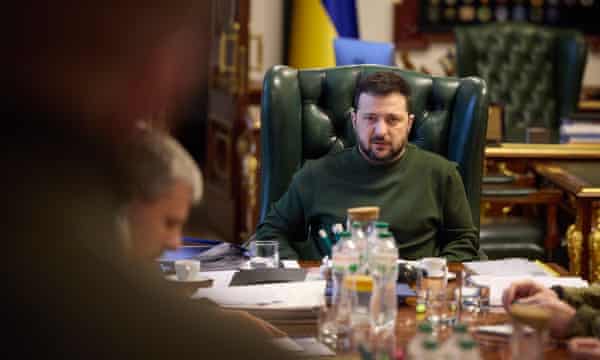 Ukrainian President Volodymyr Zelenskiy. Photograph: APAImages/REX/Shutterstock
Ukrainian President Volodymyr Zelenskiy. Photograph: APAImages/REX/Shutterstock
Due by 31 March: Ukraine is due a presidential election by the spring – Volodymyr Zelenskiy’s five-year term is up. Under martial law, elections are suspended, but observers say a vote that acts as a safety valve to release internal tensions and popular discontents would be a worthwhile exercise – even if Putin tried to bomb it.
NORTH KOREA
Expected by March: No surprises are expected in elections to the hermit state’s rubber-stamp National Assembly. However observers have noted that little has been said publicly about the polls and suggested the lack of discussion may be down to a constitutional amendment the Kim Jong Un regime wants to make regarding relations with Seoul which may mean a possible delay. Elections usually feature a 99.99% turnout, with 100% backing the ruling Workers’ party.
TOGO
By end of March: Legislative and regional elections will be held by the end of the third quarter, President Faure Gnassingbe announced in November, despite having pledged to hold them within 12 months in December 2022. The country’s last elections, in 2018 were marred by opposition boycotts. Since coming to office in 2005, President Faure Gnassingbe – who took over after the death of his father, who had ruled for 38 years – has won every election.
April
INDIA
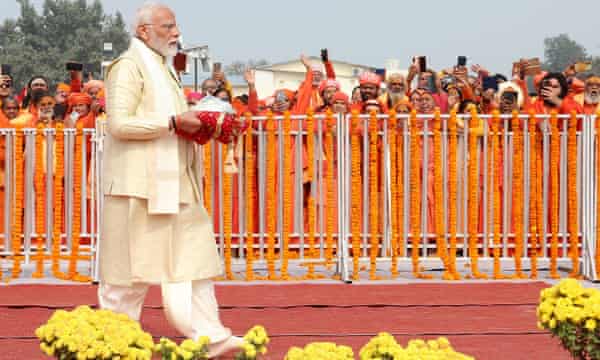 India’s prime minister Narendra Modi carries an offering to officially consecrate the Ram temple in Ayodhya in India’s Uttar Pradesh state in January. Photograph: PIB/AFP/Getty Images
India’s prime minister Narendra Modi carries an offering to officially consecrate the Ram temple in Ayodhya in India’s Uttar Pradesh state in January. Photograph: PIB/AFP/Getty Images
April- May: Prime minister Narendra Modi has been accused of overseeing an unprecedented consolidation of power since he was first elected in 2014 and he is widely expected to win a third term with his Hindu nationalist Bharatiya Janata party. Regional opposition is strong in pockets of south and east India but nationally it is seen as fragmented and weak and a recently formed coalition of all major opposition parties – which goes by the acronym INDIA – has yet to unite on crucial issues.
SOUTH KOREA
10 April: Legislative elections are predicted to be a neck-and-neck race between the two major parties, although neither is enjoying particular public favour ahead of the legislative elections and both are grappling with their own internal power struggles. Support for the already unpopular President Yoon Suk Yeol has sunk further after a scandal over a Dior bag allegedly given to his wife. The unfolding drama has not gone down well with major conservative media who are typically sympathetic to the president, with the upheaval being described as a potential “risk” for his ruling People Power party.
SOLOMON ISLANDS
April: Voters in Solomon Islands head to the polls in April. The election was slated for 2023 and delayed due to the cost of hosting the Pacific Games. In 2019 the Pacific nation switched diplomatic allegiance from Taiwan to China and prime minister Manasseh Sogavare has been pursuing closer ties ever since. A security pact struck with China in 2022 rattled the west over Beijing’s ambitions in the Pacific region – and the election will be closely watched for any deepening of the relationship.
May
PANAMA
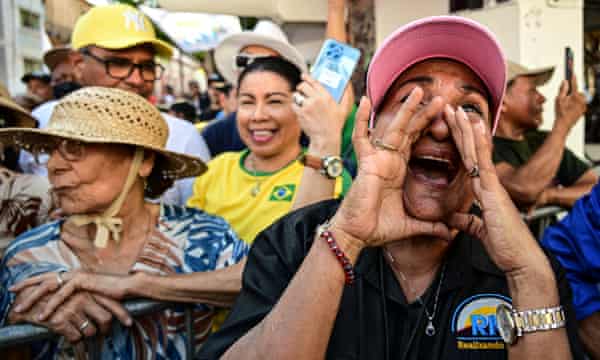 Supporters of former Panamanian president and presidential candidate Ricardo Martinelli at a rally in Panama City in February. Photograph: Martin Bernetti/AFP/Getty Images
Supporters of former Panamanian president and presidential candidate Ricardo Martinelli at a rally in Panama City in February. Photograph: Martin Bernetti/AFP/Getty Images
5 May: Former president Ricardo Martinelli is leading a crowded field in the upcoming presidential election. That’s despite a nearly 11-year prison sentence handed down last year for money laundering. Martinelli is appealing against his sentence, but should he lose his appeal he will be barred from running for office. In that case, the election could pit Martín Torrijos, another former president, against Ricardo Lombana, who leads a new centrist political movement focused on austerity and anti-corruption.
THE DOMINICAN REPUBLIC
19 May; 30 June (runoff): Centrist incumbent Luis Abinader is leading the polls, which suggest he could win over 50% in the first round of the presidential election, voiding the need for a runoff. Analysts attribute his popularity to a strong post-Covid recovery and a hardline stance on migrants from Haiti. But others say the resulting economic challenges posed by the closure of the Haiti border may erode his support. A coalition of three opposition parties could also challenge the majorities held by his Modern Revolutionary party in both houses of Congress in simultaneous legislative elections.
LITHUANIA
12-26 May: President Gitanas Nauseda, who won 66% in the 2019 runoff, will be seeking a second five-year term and is the frontrunner in this year’s elections. The independent’s main challenger will be his centre-right former opponent Ingrida Simonyte, who has since become prime minister. The country has been a staunch Ukraine supporter, and that stance is not expected to change regardless of who wins. Lithuania will also hold parliamentary elections later in the year.
MADAGASCAR
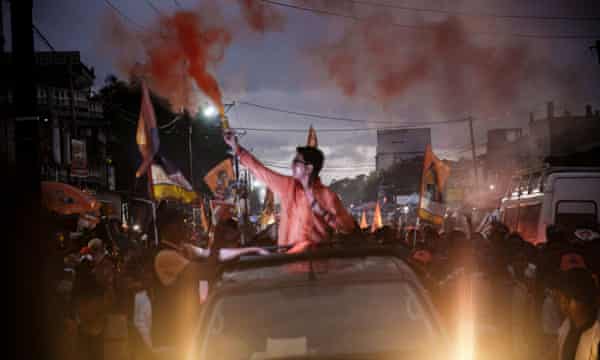 Madagascar President Andry Rajoelina rides in a pickup truck as he greets supporters during his re-election campaign, in Toamasina, November 2023. Photograph: RIJASOLO/AFP/Getty Images
Madagascar President Andry Rajoelina rides in a pickup truck as he greets supporters during his re-election campaign, in Toamasina, November 2023. Photograph: RIJASOLO/AFP/Getty Images
29 May (unconfirmed): Legislative elections are due to take place months after President Andry Rajoelina was re-elected in a vote marred by low turnout, an opposition boycott and accusations of fraud. Despite its wealth of resources, 75% of the population of the island nation off the south-east of Africa lives below the poverty line. Rajoelina’s government has been accused of sliding towards dictatorship – it banned public protests last year and has cracked down on opposition.
June
ICELAND
1 June: Five candidates have so far declared they will run for election to Iceland’s presidency after the incumbent, former history professor Guðni Th. Jóhannesson, said he would seek a third term. They include a former judge, a rescue worker and an investor, and have until 26 April to collect at least 1,500 voter signatures to make it to the ballot. Several other candidates, including actor, comedian and former Reykjavik mayor Jón Gnarr, have said they may enter the race. The role is largely ceremonial, acting as a guarantor of the constitution and national unity, although Icelandic presidents have in the past refused to sign unpopular legislation.
MEXICO
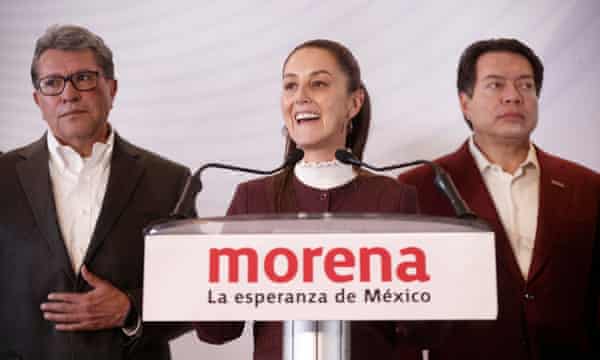 Mexican presidential candidate Claudia Sheinbaum pictured in February. Photograph: Rodrigo Oropeza/AFP/Getty Images
Mexican presidential candidate Claudia Sheinbaum pictured in February. Photograph: Rodrigo Oropeza/AFP/Getty Images
2 June: Mexico will almost certainly have its first female president this year, after the governing leftist Morena party and the opposition coalition both chose women as their candidates. Polls show Morena’s Claudia Sheinbaum, a climate-scientist-turned politician, with a double-digit lead over her rival Xochitl Galvez, candidate of a right-left alliance of three parties. Whoever wins will have to contend with widespread drug-related gang violence.
EUROPEAN PARLIAMENT
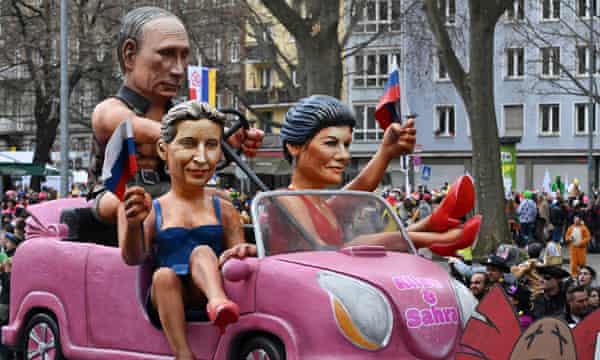 A float depicting ‘Barbies and Ken’.Russian President Vladimir Putin (L), AfD leader Alice Weidel (C) and Sahra Wagenknecht, leader of the left-wing BSW party) at the Rose Monday parade in Mainz, Germany in February. There are fears the AfD could do well in European Parliament elections. Photograph: Arne Dedert/AP
A float depicting ‘Barbies and Ken’.Russian President Vladimir Putin (L), AfD leader Alice Weidel (C) and Sahra Wagenknecht, leader of the left-wing BSW party) at the Rose Monday parade in Mainz, Germany in February. There are fears the AfD could do well in European Parliament elections. Photograph: Arne Dedert/AP
6-9 June: Populist “anti-European” parties are heading for big gains in elections across the 27-nation bloc that could shift the parliament’s balance sharply to the right and disrupt key parts of the EU’s agenda. Radical right parties are forecast to finish first in nine countries, including Austria, France and Poland, and second or third in another nine, including Germany, Spain, Portugal and Sweden. It’s not clear yet whether a centre-right, conservative and radical right MEPs will emerge with a numerical majority – still less whether such a majority could ever function – but in theory the next parliament could block or slow laws on Europe’s green deal and take a harder line on other areas of EU sovereignty including migration, enlargement and support for Ukraine.
BELGIUM
9 June: The far-right Vlaams Belang party has traditionally been excluded from Belgian coalition governments but commentators have increasingly been asking whether this can hold after the upcoming legislative elections as the party has topped opinion polls over the past year. Prime minister Alexander De Croo is well regarded but his popularity is not reflected in his conservative liberal Open VLD party’s ratings, which are at an all-time low according to one recent poll. Belgium is infamous for its lengthy coalition negotiations: after the last elections in 2019 it took more than 650 days before a government was formed.
MAURITANIA
22 June: The country’s last presidential election, in 2019, represented the first peaceful transfer of power in its history. President Mohamed Ould Cheikh Ghazouani, whose party won a comfortable victory in parliamentary elections last year, is seeking a second five-year term. He has overseen the West African country’s relative stability in the increasingly violent Sahel region.
MONGOLIA
28 June: Parliamentary elections will be the first to take place since major changes were made to the system last year, increasing the number of seats in the chamber from 76 to 126 and reducing the number of electoral districts from 29 to 13. The measures, introduced by President Khurelsukh Ukhnaa and his ruling Mongolian People’s party (MPP), are designed to attract more female candidates and ensure more diverse representation in the country which held its first free multiparty elections in 1990. The MPP can count on widespread support but observers say frustration among voters over issues like corruption could boost the opposition, especially in cities.as

2024: Year of elections
Elections tracker 2024: every vote and why it matters
More than 80 countries, more than half the world’s population, will vote this year in elections that could be pivotal for democracy
JanuaryMore than 80 countries are due to head to the polls this year, including some of the wealthiest and most powerful, the most populous, the most authoritarian and the most fragile. Many votes will test the limits of democracy, while others will be exercises in rubber-stamping. Some will be boycotted by the opposition or undermined by government crackdowns on press and dissenters. Keep track of all the results and upcoming polls with our election tracker:
BHUTAN
30 November 2023 – 9 January 2024: The tiny Himalayan kingdom elected the liberal former prime minister Tshering Tobgay and his People’s Democratic Party (PDP) with a large majority. Tobgay has vowed to promote the investment needed to boost the country’s $3bn economy and address the unemployment that is driving an increasing number of young Bhutanese abroad, mainly to Australia, in search of better opportunities.
BANGLADESH
7 January: Prime minister Sheikh Hasina won a fifth term in office in an election that was overshadowed by a ruthless crackdown on the opposition and voter turnout of just 40%. In the months leading up to the election, tens of thousands of opposition leaders and rank and file party members were arrested en masse with at least nine dying in jail in the three months preceding the election.
TAIWAN
13 January: Taiwan elected Lai Ching-te as its next president, ushering in a historic third term in power for the pro-sovereignty Democratic Progressive party (DPP) and angering Beijing. Two days after the elections, China managed to reduce the number of Taiwan’s formal diplomatic allies to just 12, and has also begun increasing its military threats, with warplanes frequently entering Taiwanese airspace.
COMOROS

14 January: President Azali Assoumani won a fourth five-year term more than two decades after he first came to power in a coup. Though the country experienced three democratic transitions of power after he first stepped down in 2006, his return in elections in 2016 have since seen him erode democratic mechanisms. After January’s vote opposition candidates alleged fraud and ballot-stuffing.
TUVALU

26 January: Tuvalu’s prime minister, Kausea Natano, lost his seat in the general election but a new leader is yet to be selected. Incoming lawmakers will decide on the Pacific nation’s next leader but dangerous weather has prevented them from reaching the capital Funafuti to hold talks. The outcome is being closely watched by Taiwan, China, the US and Australia amid a geopolitical tussle for influence in the Pacific. Tuvalu is one of three remaining Pacific allies of Taiwan, and one contender for prime minister has said the new government should review whether Taipei or Beijing can best respond to Tuvalu’s development needs.
FINLAND
28 January-11 February: Centre-right former prime minister Alexander Stubb won an election runoff against rival Pekka Haavisto in what was seen as the country’s most high-stakes presidential election in a generation. It was the country’s first poll since it joined Nato and took place amid escalating geopolitical drama on the border with Russia.
February
EL SALVADOR

4 February: President Nayib Bukele won a thumping victory after voters rewarded him for a fierce gang crackdown that has transformed security in what was once one of the world’s most dangerous countries. But his second term was unconstitutional and his New Ideas party’s sweep of parliamentary seats means Bukele will wield unprecedented power. Analysts also suggest that the suspension of civil liberties and imprisonment of more than 2% of the country’s adult population – many without charge – is unsustainable.
MALI
Were scheduled for 4 February: The junta said in September it would postpone presidential elections set for February – which was already a two-year delay on what as agreed by interim authorities after the 2020 coup led by Colonel Assimi Goïta. It appears the military plans to hang on to power indefinitely in the west African country, which has suffered an upsurge in terrorist violence since the military takeover.
AZERBAIJAN
7 February: President Ilham Aliyev won his fifth term with over 90% of votes in elections observers said were neither free nor fair. He had called the poll early after recapturing the breakaway region of Nagorno-Karabakh from Armenia last year and launching a crackdown on independent journalists.
HAITI
Were due by 7 February 2024: Elections were supposed to happen in 2023 with an earlier agreement in place for power to have been transferred by 7 February 2024. Since the assassination of president Jovenel Moïse in 2021, Haiti has descended into crisis, with violence from street gangs and vigilantes prevalent. In 2023, the last 10 remaining senators in parliament officially left office, leaving the country without a single democratically elected government official. In February this year, prime minister Ariel Henry, who himself is seen as illegitimate by most Haitians, pledged to hold general elections as soon as the security issues were resolved.
PAKISTAN

8 February: Despite opposition from the powerful military and a state-led crackdown, the PTI party of jailed former prime minister Imran Khan won the most votes in legislative elections. However after days of wrangling and political horse-trading a coalition including the rival Pakistan Muslim League-Nawaz (PLM-N) and the Pakistan People’s party (PPP) agreed to form the next government with Shehbaz Sharif as prime minister and ensure that that the PTI party cannot take power.
INDONESIA
14 February: Prabowo Subianto, a 72-year-old former general who was dismissed from the military amid allegations he was involved in kidnapping and torture in the 1990s, is on course to win the presidency in the world’s third largest democracy with more than half of votes counted. Prabowo has always denied wrongdoing but the results have provoked fear among rights activists that accountability for past atrocities will fade even further under his leadership, and that his future government will have little regard for human rights.
BELARUS

25 February: No surprises are expected in this year’s parliamentary elections, the first since presidential elections won by longtime dictator Alexander Lukashenko sparked widespread protests in 2020. He has since cracked down even harder on opposition figures, including his main challenger Svetlana Tikhanovskaya who is now in exile. But the elections will see the All-Belarusian People’s Assembly become an official organ with immense powers, after a constitutional change made last year. According to one analyst, “It’s a step on the path to a Belarus without its contested leader Alexander Lukashenko, even if it’s impossible to say how long that path will be.”
CAMBODIA
25 February: Human rights activists have warned that the country is “continuing on its descent into authoritarianism” ahead of Senate elections. Last year Hun Sen, who had ruled the country for almost four decades, handed power to his son, military general Hun Manet, just a month after parliamentary elections widely criticised as a sham. Opposition leaders continue to be jailed and activists have reported brutal physical attacks.
SENEGAL
Were scheduled for 25 February: President Macky Sall’s decision to delay presidential elections scheduled for 25 February just weeks beforehand triggered outrage from the opposition and pitched the west African nation, one of the region’s more stable democracies, into uncharted constitutional waters. However Sall later pledged to abide by a court ruling that overturned the election postponement bill and said he would hold consultations to organise the vote as soon as possible. Some opposition figures have called on Sall to set an election date before 2 April, when his mandate expires.
March
IRAN

1 March: Elections for parliament (Majlis) and the Assembly of Experts, the body which chooses the Supreme Leader, will be the first since the massive protests sparked by the death of Kurdish woman Mahsa Amini in police custody in 2022. Observers have therefore said that turnout could have a “symbolic value”. However, Supreme Leader Ali Khamenei has already disqualified reformist former president Hassan Rouhani from running for the assembly and in the last Majlis election disqualified half of the candidates.
PORTUGAL
10 March: The second snap election in as many years was called in November after the Socialist prime minister António Costa resigned amid a corruption investigation. Polls indicate the party will win the most votes, but not enough for it to form a government. A centre-right coalition is predicted to hold the majority, and as in other European countries the far-right is expected to make gains. In February, the far-right Chega party jumped 6 percentage points in an opinion poll to break the 20% support mark for the first time.
RUSSIA

15-17 March: In an election which appears to be a formality, President Vladimir Putin will seek a fifth term. Political opposition already clamped down on by his government has been further stifled after his invasion of Ukraine two years ago with prominent opposition politicians such as Alexei Navalny and Ilya Yashin jailed. Just a month before the election Navalny died in unclear circumstances in prison, leaving what little opposition remains without a charismatic figurehead. Western leaders have blamed Putin for his death. Voting will also take place in what Russia calls its new territories; parts of Ukraine now occupied by Russian forces.
SLOVAKIA
23 March: While populist, pro-Moscow prime minister Robert Fico isn’t running, he could be the biggest winner if he succeeds in getting the presidential candidate backed by his three-party coalition elected. The vote will show how the country feels about his comeback last year after being forced to resign amid mass protests in 2018. If no candidate wins a majority in the first round a run-off between the top two candidates will be held two weeks later.
UKRAINE

Due by 31 March: Ukraine is due a presidential election by the spring – Volodymyr Zelenskiy’s five-year term is up. Under martial law, elections are suspended, but observers say a vote that acts as a safety valve to release internal tensions and popular discontents would be a worthwhile exercise – even if Putin tried to bomb it.
NORTH KOREA
Expected by March: No surprises are expected in elections to the hermit state’s rubber-stamp National Assembly. However observers have noted that little has been said publicly about the polls and suggested the lack of discussion may be down to a constitutional amendment the Kim Jong Un regime wants to make regarding relations with Seoul which may mean a possible delay. Elections usually feature a 99.99% turnout, with 100% backing the ruling Workers’ party.
TOGO
By end of March: Legislative and regional elections will be held by the end of the third quarter, President Faure Gnassingbe announced in November, despite having pledged to hold them within 12 months in December 2022. The country’s last elections, in 2018 were marred by opposition boycotts. Since coming to office in 2005, President Faure Gnassingbe – who took over after the death of his father, who had ruled for 38 years – has won every election.
April
INDIA

April- May: Prime minister Narendra Modi has been accused of overseeing an unprecedented consolidation of power since he was first elected in 2014 and he is widely expected to win a third term with his Hindu nationalist Bharatiya Janata party. Regional opposition is strong in pockets of south and east India but nationally it is seen as fragmented and weak and a recently formed coalition of all major opposition parties – which goes by the acronym INDIA – has yet to unite on crucial issues.
SOUTH KOREA
10 April: Legislative elections are predicted to be a neck-and-neck race between the two major parties, although neither is enjoying particular public favour ahead of the legislative elections and both are grappling with their own internal power struggles. Support for the already unpopular President Yoon Suk Yeol has sunk further after a scandal over a Dior bag allegedly given to his wife. The unfolding drama has not gone down well with major conservative media who are typically sympathetic to the president, with the upheaval being described as a potential “risk” for his ruling People Power party.
SOLOMON ISLANDS
April: Voters in Solomon Islands head to the polls in April. The election was slated for 2023 and delayed due to the cost of hosting the Pacific Games. In 2019 the Pacific nation switched diplomatic allegiance from Taiwan to China and prime minister Manasseh Sogavare has been pursuing closer ties ever since. A security pact struck with China in 2022 rattled the west over Beijing’s ambitions in the Pacific region – and the election will be closely watched for any deepening of the relationship.
May
PANAMA

5 May: Former president Ricardo Martinelli is leading a crowded field in the upcoming presidential election. That’s despite a nearly 11-year prison sentence handed down last year for money laundering. Martinelli is appealing against his sentence, but should he lose his appeal he will be barred from running for office. In that case, the election could pit Martín Torrijos, another former president, against Ricardo Lombana, who leads a new centrist political movement focused on austerity and anti-corruption.
THE DOMINICAN REPUBLIC
19 May; 30 June (runoff): Centrist incumbent Luis Abinader is leading the polls, which suggest he could win over 50% in the first round of the presidential election, voiding the need for a runoff. Analysts attribute his popularity to a strong post-Covid recovery and a hardline stance on migrants from Haiti. But others say the resulting economic challenges posed by the closure of the Haiti border may erode his support. A coalition of three opposition parties could also challenge the majorities held by his Modern Revolutionary party in both houses of Congress in simultaneous legislative elections.
LITHUANIA
12-26 May: President Gitanas Nauseda, who won 66% in the 2019 runoff, will be seeking a second five-year term and is the frontrunner in this year’s elections. The independent’s main challenger will be his centre-right former opponent Ingrida Simonyte, who has since become prime minister. The country has been a staunch Ukraine supporter, and that stance is not expected to change regardless of who wins. Lithuania will also hold parliamentary elections later in the year.
MADAGASCAR

29 May (unconfirmed): Legislative elections are due to take place months after President Andry Rajoelina was re-elected in a vote marred by low turnout, an opposition boycott and accusations of fraud. Despite its wealth of resources, 75% of the population of the island nation off the south-east of Africa lives below the poverty line. Rajoelina’s government has been accused of sliding towards dictatorship – it banned public protests last year and has cracked down on opposition.
June
ICELAND
1 June: Five candidates have so far declared they will run for election to Iceland’s presidency after the incumbent, former history professor Guðni Th. Jóhannesson, said he would seek a third term. They include a former judge, a rescue worker and an investor, and have until 26 April to collect at least 1,500 voter signatures to make it to the ballot. Several other candidates, including actor, comedian and former Reykjavik mayor Jón Gnarr, have said they may enter the race. The role is largely ceremonial, acting as a guarantor of the constitution and national unity, although Icelandic presidents have in the past refused to sign unpopular legislation.
MEXICO

2 June: Mexico will almost certainly have its first female president this year, after the governing leftist Morena party and the opposition coalition both chose women as their candidates. Polls show Morena’s Claudia Sheinbaum, a climate-scientist-turned politician, with a double-digit lead over her rival Xochitl Galvez, candidate of a right-left alliance of three parties. Whoever wins will have to contend with widespread drug-related gang violence.
EUROPEAN PARLIAMENT

6-9 June: Populist “anti-European” parties are heading for big gains in elections across the 27-nation bloc that could shift the parliament’s balance sharply to the right and disrupt key parts of the EU’s agenda. Radical right parties are forecast to finish first in nine countries, including Austria, France and Poland, and second or third in another nine, including Germany, Spain, Portugal and Sweden. It’s not clear yet whether a centre-right, conservative and radical right MEPs will emerge with a numerical majority – still less whether such a majority could ever function – but in theory the next parliament could block or slow laws on Europe’s green deal and take a harder line on other areas of EU sovereignty including migration, enlargement and support for Ukraine.
BELGIUM
9 June: The far-right Vlaams Belang party has traditionally been excluded from Belgian coalition governments but commentators have increasingly been asking whether this can hold after the upcoming legislative elections as the party has topped opinion polls over the past year. Prime minister Alexander De Croo is well regarded but his popularity is not reflected in his conservative liberal Open VLD party’s ratings, which are at an all-time low according to one recent poll. Belgium is infamous for its lengthy coalition negotiations: after the last elections in 2019 it took more than 650 days before a government was formed.
MAURITANIA
22 June: The country’s last presidential election, in 2019, represented the first peaceful transfer of power in its history. President Mohamed Ould Cheikh Ghazouani, whose party won a comfortable victory in parliamentary elections last year, is seeking a second five-year term. He has overseen the West African country’s relative stability in the increasingly violent Sahel region.
MONGOLIA
28 June: Parliamentary elections will be the first to take place since major changes were made to the system last year, increasing the number of seats in the chamber from 76 to 126 and reducing the number of electoral districts from 29 to 13. The measures, introduced by President Khurelsukh Ukhnaa and his ruling Mongolian People’s party (MPP), are designed to attract more female candidates and ensure more diverse representation in the country which held its first free multiparty elections in 1990. The MPP can count on widespread support but observers say frustration among voters over issues like corruption could boost the opposition, especially in cities.as

